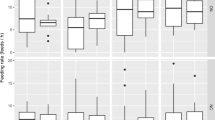Abstract
Conflict between parents and offspring may result in offspring exaggerating their needs and parents devaluing their begging signals. To determine whether this occurs, it is first necessary to establish the link between need, begging and parental response. The purpose of our study was to examine these relationships in tree swallows (Tachycineta bicolor). Parents preferentially fed nestlings that begged sooner, reached higher and were closer to the front of the nestbox (Fig. 1). Begging intensity of both individuals and entire broods increased with relatively long periods between feeding visits. Within broods, parents responded to increased begging intensity by increasing their feeding rate, although this effect was relatively weak. Large and small nestlings did not differ in their begging behavior and all nestlings, regardless of size, were fed at similar rates. Despite the overall equity in feeding, male parents preferentially fed larger nestlings while female parents fed smaller nestlings. Nestlings did not increase their begging intensity in response to begging by nestmates. Our results suggest that begging is related to need in this species and that parents respond to variation in begging intensity.
Similar content being viewed by others
Author information
Authors and Affiliations
Additional information
Received: 4 May 1995/Accepted after revision: 17 December 1995
Rights and permissions
About this article
Cite this article
Leonard, M., Horn, A. Provisioning rules in tree swallows. Behav Ecol Sociobiol 38, 341–347 (1996). https://doi.org/10.1007/s002650050250
Issue Date:
DOI: https://doi.org/10.1007/s002650050250




